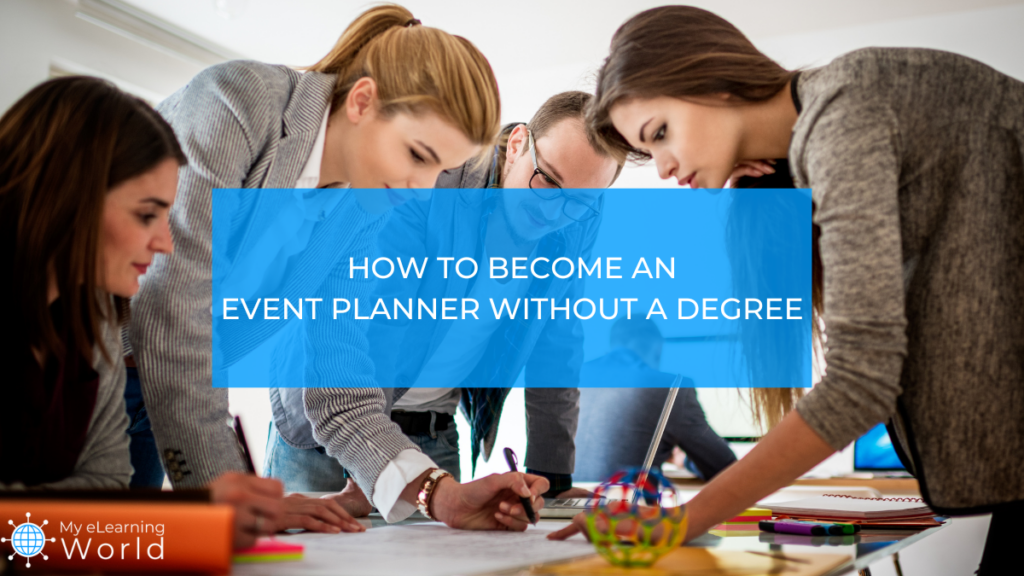Looking for practical tips on how to become an event planner without a degree?
Guess what? You don’t need a fancy degree or a hefty tuition bill to turn your passion for creating unforgettable experiences into a successful career. Especially with online learning platforms like Skillshare, shelling out tens of thousands of dollars for an event planning degree is not necessary. Gone are the days when a traditional university education was required to break into the event planning industry.
Just imagine being the mastermind behind incredible weddings, corporate galas, and music festivals, without having to endure the burdens of student loans or years of academic study. It’s entirely possible!
The event planning landscape has evolved, embracing alternative pathways to success.
Whether you’re a creative soul with a knack for organizing, a natural-born leader who thrives under pressure, or simply someone who enjoys crafting memorable experiences, this is your chance to break free from the traditional education mold. We firmly believe that passion, determination, and a strategic approach are the keys to unlocking your dream career.
So if you’re organized and have a knack for details, event planning could be the career for you.
In the guide below, we’ll walk you through practical strategies and insider tips that will inspire and empower you to forge your own path to becoming a sought-after event planner.
Here’s what you need to know about how to become an event planner without a degree.
Disclosure: Some of the links in this article are affiliate links, meaning at no additional cost for you, we might get a commission if you click the link and purchase.
What is an Event Planner?
An event planner is someone who organizes and executes events. This includes everything from researching locations to setting up contracts with vendors to overseeing on-site logistics.
There are many different types of event planners, each with its specialty.
For example, a wedding planner will be responsible for organizing all aspects of a couple’s big day, from finding the perfect venue to coordinating with vendors.
A corporate event planner, on the other hand, might be in charge of organizing large-scale events such as product launches or company retreats.
A kid’s birthday party planner on the other hand will work with families to throw memorable birthday celebrations.
There are also event planners who specialize in specific types of events, like music festivals or trade shows.
What Skills Do You Need to Become an Event Planner?
No matter what type of event you’re planning, there are some essential skills that all event planners need to possess.
Here are the essential skills needed to become a good event planner:
- Organizational Skills. This is the most important skill for an event planner. You need to be able to keep track of countless details and deadlines all at once. From nailing down the venue to ordering supplies, there are a lot of moving parts to keep track of. For instance, if you’re planning a conference, you’ll need to coordinate with different speakers, schedule breakout sessions, and make sure the AV equipment is working properly. If you’re organizing a wedding, you’ll need to keep track of the guest list, plan the menu, and find the perfect vendors.
- Communication. As an event planner, you’ll be working with a lot of different people, from clients to vendors to venue staff. And you’ll need to be able to communicate effectively with all of them. This means being able to listen to their needs and concerns, as well as being able to clearly explain your vision for the event. You should also have strong written communication skills. This will come in handy when you’re drafting proposals or sending out emails to potential clients.
- Creativity. An event planner needs to be creative to come up with unique and innovative ideas for their events. Whether you’re planning a corporate gala or a child’s birthday party, your goal should be to create an event that is memorable and one-of-a-kind. This also means thinking outside the box and coming up with creative solutions to problems that may arise. For instance, if you’re working with a tight budget, you’ll need to get creative to stretch your dollars. Or if you’re planning an outdoor event and the weather forecast is calling for rain, you’ll need to come up with a creative contingency plan.
- Leadership skills. As an event planner, you’ll often be in charge of a team of people. This could be a group of volunteers, venue staff, or even other event planners. And you’ll need to be able to lead them effectively in order to ensure that the event runs smoothly. This means being able to delegate tasks, give clear instructions, and provide feedback. You should also be able to manage conflict and keep everyone on track.
- Marketing skills. As an event planner, you’ll need to be able to market your services effectively. This means having a strong understanding of the various marketing channels, as well as knowing how to create compelling marketing materials. You should also be familiar with social media, as this is a great way to promote your events and connect with potential clients. In addition, you’ll need to be able to network effectively to build relationships with potential clients and partners.
A Step-by-Step Guide to Becoming an Event Planner
Countless people have found great success in the event planning industry without a degree. If they can, why should you spend 4 years and thousands of dollars on a degree?
Of course, there’s no one-size-fits-all answer to this question. The decision of whether or not to get a degree is a personal one that depends on your specific situation.
But if you’re considering becoming an event planner without a degree, here’s a step-by-step guide to help you get started.
1. Choose Your Niche
The first step is to choose your niche. Event planning is a diverse field with various niches, including weddings, corporate events, social gatherings, nonprofit fundraisers, and more. And there are also a number of different roles that you can play within the event planning industry, from coordinator to designer.
By choosing a niche that aligns with your interests, strengths, and personal style, you set yourself up for success and stand out in a competitive industry.
Think about the type of events that you’re interested in and the role that you want to play.
To begin, take some time for self-reflection. Consider the types of events that truly ignite your passion. Are you drawn to the elegance and romance of weddings, or do you thrive in the fast-paced environment of corporate events?
Assess your strengths and skills. Are you particularly skilled at negotiating contracts and managing logistics, or do you excel in creative design and theme conceptualization?
Understanding your strengths and interests will help you narrow down your niche.
Do your research and make sure that there’s a demand for the services that you want to offer. Once you’ve narrowed down your focus, you can start to build your brand around it.
2. Sign up for Online Classes to Learn the Basics of Event Planning
 Skillshare
Skillshare
Skillshare is the ultimate website for learning just about anything imaginable. You can explore 30,000+ online classes across countless categories, from business to hobbies and more.
Even if you don’t have a degree, potential clients would like to know that you still have some kind of formal training. This is where event planning classes come in.
When pursuing a career in event planning without a degree, online courses can be a game-changer.
There are a number of different online classes that you can take, ranging from introductory courses to more specialized ones. If you’re looking to get quality training, online learning platforms like Skillshare (free 30-day trial) offer great online course programs that you can sign up for to gain the knowledge you need to thrive in the industry.
Here’s why taking online courses in event planning can be an excellent option for aspiring planners.
First and foremost, affordability is a significant advantage of online courses. Traditional university programs often come with hefty tuition fees, making them inaccessible for many individuals. However, online platforms like Skillshare offer a wide array of event planning courses at a fraction of the cost. You can access a range of courses, from introductory basics to specialized topics, without breaking the bank. This affordability allows you to invest in your education without worrying about overwhelming student loan debt.
Convenience and flexibility are additional benefits of online learning. With online courses, you have the freedom to learn at your own pace and fit your studies around your existing commitments. Whether you have a full-time job, family responsibilities, or other obligations, online courses provide the flexibility to design a study schedule that works best for you. You can access course materials anytime, anywhere, and revisit them whenever needed, allowing for a personalized and convenient learning experience.
Online courses often provide hands-on training and practical assignments that simulate real-world scenarios. This experiential learning approach equips you with practical skills and knowledge that are directly applicable to event planning. Through video tutorials, case studies, and interactive exercises, you can develop essential event planning skills such as budgeting, vendor management, event promotion, and more.
Lastly, online courses provide access to a diverse community of instructors and fellow learners. Skillshare, for example, features instructors who are experienced professionals in the event planning industry. By learning from their expertise, you gain valuable insights and industry-specific knowledge.
Make sure to see our Skillshare review for a whole lot more info on all that the platform offers.
Click here to try Skillshare free for one month.
3. Get Some Experience
The next step is to get some experience. Even if you don’t have a degree, you can still volunteer or intern with event planning companies. This will give you the opportunity to learn about the industry and gain some valuable hands-on experience.
One of the most effective ways to gain experience is by volunteering or interning with event planning companies or organizations. Reach out to local event planners, wedding planners, or even non-profit organizations that organize events. Express your enthusiasm, willingness to learn, and desire to contribute to their projects. Volunteering or interning allows you to immerse yourself in the industry, observe professionals in action, and learn from their expertise.
By participating in real event planning activities, you acquire practical skills, knowledge, and a deeper understanding of the complexities involved in executing successful events. You may assist with tasks such as event setup, vendor coordination, attendee management, or budget tracking. Every experience, no matter how small, offers a valuable learning opportunity and helps build a solid foundation for your future career.
Volunteering or interning exposes you to valuable networking opportunities. As you work alongside professionals and interact with industry stakeholders, you can establish connections and foster relationships that may lead to future job prospects or mentorship opportunities. Building a strong network within the event planning community is essential for career advancement and accessing a wider range of opportunities.
In addition, you can also get involved with your local community by planning events for non-profit organizations. Not only will this help you build your portfolio, but it will also allow you to give back to the community.
4. Build Your Portfolio
As you start to gain experience, you’ll also want to start building your portfolio. This is a collection of your best work that you can use to showcase your skills and abilities.
A well-crafted portfolio serves as tangible proof of your capabilities as an event planner. It allows potential clients, employers, or collaborators to see the results of your work and the impact you have made on past events. It becomes your visual resume, enabling others to assess your expertise and make informed decisions about working with you.
Your portfolio should include a mix of events that you’ve planned, as well as any related experience that you have.
For example, if you’ve worked as a coordinator, you can include a list of the events that you’ve coordinated. Or if you’ve done any event design work, you can include images of your designs.
To begin building your portfolio, gather evidence of your involvement in various events, including photos, videos, event programs, or testimonials from clients or attendees. Select the projects that best represent your skills, creativity, and ability to deliver successful events.
As you gain more experience and complete new projects, regularly update your portfolio to reflect your growth and recent accomplishments. Emphasize the unique aspects of each event and the innovative strategies you employed. Remember to seek permission from clients or event organizers to use their images and testimonials in your portfolio, respecting confidentiality and privacy concerns.
5. Start Freelancing
Freelancing is a great way to get started in the event planning industry without having to commit to a full-time job.
There are a number of different ways that you can find clients for your own event planning business, from online job boards to personal networking.
You can also sign up for sites like Fiverr and Freelancer, which connect freelancers with clients who need their services. These sites can be a good way to find people who need help planning and organizing events.
Once you’ve landed your first few clients, be sure to deliver quality work so that you can get good reviews and build up a solid reputation.
A Final Word on Becoming an Event Planner without a Degree
A career in event planning can be very rewarding, both personally and professionally. And while a degree may give you a leg up, it’s definitely not necessary to break into the industry.
If you’re interested in becoming a professional event planner, use this guide as a starting point. Choose your niche, get some experience, build your portfolio, and start freelancing. With hard work and dedication, you can achieve your goals and carve out a successful career in event planning.
Do you have any questions on how to become an event planner without a degree? Let us know in the comments below!



